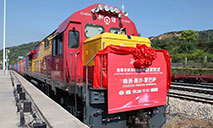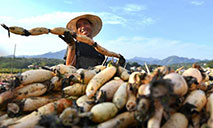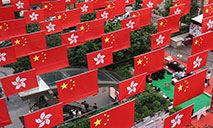Neil Bush: How should U.S. react to a rising China?
Fifty years ago, ping-pong diplomacy and Henry Kissinger’s secret trip to China ushered in a new era of U.S.-China relations. Fifty years later, Washington and Beijing are still exploring ways to drive ahead relations between the world’s two big powers.
Looking back on the twists and turns, we always remember the guides, the pathfinders like Chinese people's old friend President George H.W. Bush. He and his son George W. Bush paid more visits to China than any other U.S. president.
In the latest "W.E. Talk", a column of China News Network, Dr. Wang Huiyao, founder and president of the Center for China and Globalization (CCG), talked with Neil Bush, son of former U.S. President George H.W. Bush and founder of the George H.W. Bush Foundation for U.S.–China Relations, about how two giants with different systems and backgrounds could seek common grounds while reserving differences to work together on global safety, peace, and prosperity.
Here’s an excerpt of the dialogue:
A Leap Forward: China’s transformation was unimaginable
Wang Huiyao: I remember you said your first visit to China was in 1975 and you continued traveling to China on a regular basis since then. Given you have traveled to China many times and have witnessed first-hand in the last five decades the tremendous changes that China has made, maybe you could give your first assessment of what you see in the relationship?
Neil Bush: I think I'll start by reflecting back on October 1971. You mentioned that China was re-admitted to the UN and I happened to be in New York City during that vote. The first thing my dad did when the Chinese delegation arrived in the United States was inviting them to a lunch at my grandmother’s home in Connecticut to show American hospitality. And from that point on, his first real contact with Chinese leaders, my dad has had affection for the Chinese people and has high aspirations for how our two great countries should be working together.
Yes, I was in Beijing in 1975. Three of my siblings and I visited China for five weeks. We were in Beijing for four weeks and then traveled with my mother by train to Wuxi, Nanjing, and Shanghai. So looking back 46 years later, if I were back in 1975, I couldn't have predicted or imagined that China would have had hundreds of millions of people lifted out of poverty; that the middle class would be growing as rapidly as it is; that the economy continues to turn out new jobs and crank out wealth for people; that people would enjoy daily freedoms that frankly back then were clearly unimaginable in China. I've been deeply impressed by this.
I think one of the things that separates me from other folks is the fact that I've been there and seen it grow over the many years. I've come to some deep conclusions. One, there's no single system that works for every country. Every country needs to develop a system that is suitable and fitting for the conditions of that country. China's system has worked for China, if you look at the results over the 46 years since I was there and over the 40-something years since formal ties have been established. The results speak for themselves. I am a believer that our system works for us and the Chinese system works for China. We need to be respectful of that.
Wang Huiyao: Do you still remember some of the things you saw in Beijing at the time?
Neil Bush: We rode bikes all over the place. It was really fun. We rode to Tiananmen Square. I distinctly remember pulling up to a stop sign, where the guards were there, with their hands up and the crowd of bikes were stopped. When [they saw] those of us that were from America, the kind of white guys with long noses, they looked over and saw us and they almost fell off their bikes. We went to the zoo to go see the pandas and other animals, and there was a bigger crowd following us at the zoo than they were looking at the animals. But it was a friendly adventure for us.
One of the things I observed, and this is something dad and I talked about during the trip, was that if you observe Chinese consumers, individuals, walking by a bike shop or a shop that had kitchen utensils or whatever, you could see in their eyes that they wanted more, that they wanted a better bike, a better “Flying Pigeon”. And so it was pretty clear that there were aspirations even then that have now led to this incredible growth and the realization of potential.
And now I go back to China, cars are everywhere. It's totally transformed. High-speed rails and internet connectivity are everywhere. It's like a whole new world that couldn't have been imagined back in the bicycle-riding days of the 1970s.
It’s a leap forward. As I mentioned, high-speed rail. Other developing countries or even developed countries in the world can't keep up with China in the deployment of high-speed rail. And I've been on many train rides that have been very efficient. They are quiet. They are fast. They are clean. There's a leap of capability that China is enjoying that really sets it apart in many respects. So yeah, it has gone from bicycle- to car-consuming capital of the world and also now a leap to high-speed rail.
U.S.-China trade war tariffs have been detrimental in every way
Wang Huiyao: For the last several years, probably the last five years, particularly since Republican President Trump took office, we saw China-U.S. relations somehow deteriorate quite a bit. So how do you assess current China-U.S. relations and how could it reach normalcy? How can both countries work better towards a better relationship?
Neil Bush: First of all, you referenced the deterioration in the relationship and it strikes me that there are a number of converging factors that have led to the U.S. side becoming fearful of China's rise and that fear is reflected in rhetoric that has become quite harsh under the Trump administration. And with that became a kind of an isolationist approach of stepping back and not having dialogues. My dad believed at his core that countries, families and friends need to stay in touch with one another in order to better understand one another, in order to put yourself in the other guy's shoes, so that when conflict arises you can address those conflicts in a mature way. We got away from that for five years or so and maybe even prior to that.
That coupled with the U.S. problem of “America First,” “Build the wall,” anti-immigration, and “we are the greatest country on the face of the planet,” and to see China's economic rise to where it's now just behind the U.S. economy on a gross basis, not per capita, but gross basis. You know a lot of politicians are fearful of losing our prominence in that way.
And then a third factor is politically given that there's not very good information about China floating around in this ecosystem in the U.S. Politically China is an easy target. We see politicians blasting the Communist Party as though it was the party that manifested itself in different ways very early in the People's Republic of China's history. So then there's a lot of China-bashing. And it gets to the Thucydides Trap issue - as China rises and America being the prominent power in the world facing this rising power, how are we going to react? A lot of people in our country and many politicians are reacting quite poorly to it and thinking that China is an existential threat to our economic and national security.
Clearly any bilateral relationship is going to have issues between countries. We have issues with France. We have issues with Germany. We have issues with Israel. We have issues with our closest friends. We're going to have issues with China and we're going to address them. We have values that we stand firmly behind. We’re going to express those values in a way that's hopefully respectful and not finger-pointing or in a derogatory way. We’ll express our values in the hopes that we can help shape outcomes in that kind of thing. But the ultimate goal should be to come together as often as possible in as many different ways as possible and to resolve challenges respectfully and maturely.
My view of the tariffs is: it was such a stupid idea to start with - raising tariffs that was a tax on American consumers, hurting American businesses. It was a non-starter. There's nothing in Economics 101 that says that a trade imbalance is unnatural or inappropriate or bad. So it was a silly thesis in the first place. Deep down inside, that logic might have been punitive towards the Chinese to try to set the Chinese economy back. But that was illogical as well. So it was a failed policy that needs to be reversed.
“Covid peace” depends on the U.S. and China collaborating in addressing the pandemic and climate change
Wang Huiyao: The whole world is facing a huge challenge. We've been in this COVID-19 pandemic, which is really still cutting us off, at least in terms of travel. And now we have actually become more divided because of COVID-19. There’s the origin-tracing issue, blaming and finger- pointing to China. How do you think that we should really work together on this? How can we really get the U.S. and China to focus on pandemic-fighting, rather than finger-pointing and shouting at each other?
Neil Bush: That’s a great question, and it's a question I would ask on a number of major topics that affect the sustainability of life on Earth for humans, including climate change, food insecurity and everything health-related. The pandemic is kind of the most obvious and most pressing matter that you brought up. But because of climate change, we have all kinds of natural disasters. How can we learn to either alter course amid climate change, so that the Earth will be able to carry on for many more years beyond the current trajectory … so these are big issues and clearly the two largest economies in the world have to work together. In fact, it's hard to imagine solving these issues without the collaboration of China and the United States. There's a clear mandated necessity for all of us to share our common humanity in addressing these kinds of issues. We should learn from one another.
We should be open-minded about looking at what New Zealand has done, what Australia has done, what China has done and what other countries have done. We should share the best technologies that exist for vaccine development and have manufacturers all over the world convert their manufacturing to vaccine manufacturing of qualified vaccines so that the global population could be more readily vaccinated against this pandemic. All of these kinds of things need an environment of collaboration, which, sadly, doesn't exist today.
I do believe that this administration (the Biden administration) is already creating more opportunities for exchange and dialogue and inevitably when you sit down and you have dialogue with counterparts, good things come out of it: better understanding in addressing serious issues. The topic of collaborating on the pandemic and healthcare-related issues in general should be front and center on the table for discussion.
Wang Huiyao: So how can we really improve? What are the low-hanging fruits? Can we start with climate change, so that we can get some positive news? Can we have U.S. students back in China? Or can we have the consulate resume business in both Houston and Texas and in China?
Neil Bush: One of the great blessings of connectivity is having so many thousands of students come to the United States every year. We're a land of immigrants. I know these students aren't immigrating, but it’s wonderful how America has taken the best of talents from all over the world. They come to this part of the world, they learn and go back to their countries, or stay and help us build our economies. There's so much value to those student experiences, both U.S. students going to China and vice versa.
Cooperation between the U.S. and China in the energy sector could allow win-win partnerships
Wang Huiyao: I also have some examples in terms of collaboration. We know that Texas is abundant with energy and the energy cooperation between China and the U.S. is one of the big areas. Before Trump started the trade war, we saw a lot of cooperation on trade. But actually, the lack of infrastructure in Texas is detrimental to the export to China, while Chinese companies could help out on those infrastructures, such as joint venture with U.S. companies to do that. Another area would be about the air space and aviation. So, what will be some areas that could promote further collaboration?
Neil Bush: I love your suggestion that we should be very open to having joint venture collaborations. Investment in infrastructure by Chinese joint ventures with American companies to get access to these supplies make total sense to me. You mentioned aerospace, the Bush China Foundation has been a co-sponsor of an event that's happened three years in a row, called the International Symposium for the Peaceful Use of Space Technology with a focus on health. And this organization has brought together leading space-related agencies and organizations from around the world, from Europe, France and Germany from Japan and Russia, the United States and it has been pretty remarkable. The last couple of sessions have been in-person in China but virtual for all those outside of China. But the first forum that was held in Hainan was very successful in bringing people together. I'm not sure about the privatization of space and how that there's going to be competition - to get out there, to try to attract customers, to make the economics of space travel for tourists, the space will be competitive. But there are all kinds of science that can be gleaned from space-related work and that's the kind of science that's going to benefit humankind and to the extent that China brings something of value to that exploration and we bring something of value and the Europeans too - we should collaborate, no doubt about it.
China and the U.S. should unite to tackle challenges in public health instead of politicizing them
Wang Huiyao: Regarding the investigation of virus origins, some argue that there's more politics in it than science, and so what is your thought on that, and how should China and the U.S. cooperate on fighting against the pandemic?
Neil Bush: I am not as concerned, for example, about the origin of climate change. Whether humans cause climate change or whether it's a natural occurrence or whether some combination. The fact is that there is climate change and we need to address it and there is clearly a role for the U.S. and China and all the nations of the world to lock arms, in addressing it. China's got its 2060 carbon neutrality pledge. Governments at all levels, the private sector will be unified in their effort to do that, and I have no doubt that China would be major players in the collaboration to try to address climate change.
The same thing rings true to me with the virus. Who cares where it originated? Whether it originated in a lab or from a bat or from the United States or from others, wherever it originated, who cares? The fact is that we have a pandemic that continues to affect the lives of hundreds of thousands of people all across the globe and there is a pressing need for mature civilized nations in the world to work together. It seems that collaboration is very natural when it comes to something as big as this.
And the origins of it, and I will put a little caveat that I reject the idea that there was some malicious effort to release a virus that causes a pandemic. I think that is a crazy notion - there are some intent from one side or the other to do this on purpose. So throw away the crazy conspiracy theories. And just assume that there was an origin of some kind. It doesn't matter where it originated. Let’s deal with it together.
Wang Huiyao: How can we go forward given the legacy of both Bush presidents?
Neil Bush: I think I will start by reiterating what my father often said, publicly and openly, that the bilateral relationship between the United States and China is the most important bilateral relationship in the world. It was prescient of him to say that many years ago because it is becoming more true now than ever given that the gravity of issues that we face as humans on Earth.
I would further say that, given the United States economy, our GDP and our individual wealth, a huge shot in the arm, our biggest partner in the world of globalization has been China. So the United States has been a beneficiary of trade as imperfect as it is.
This trade relationship has benefited our country tremendously, and there is no doubt that China has been an enormous beneficiary of our trade relationship as well. As we’ve had more and more cultural and student exchanges. There have been millions of Chinese visitors to the United States. They all happily go home to China. It’s not like there’s something restraining them from getting back to their homes or desires to go home. But the reality is that we benefited tremendously from this bilateral relationship, so the past to me is what we should look to in predicting the future. The future is going to be even better. And we’ve come in to this, kind of a crazy time, where China’s rise all of a sudden being recognized by politicians as a threat to the United States. And once we can get over the hurdle that China doesn’t represent a threat to our national security, to our economy, to our freedom or basic way of life, then through dialogue we will establish a better understanding and more cooperation. So I pledge to continue to work with our team at the Bush China Foundation to do whatever I can, to help speak truth and shed light on this very important relationship in a way that hopefully will allow for greater collaborations across the board, not only on all major issues, but on basic things that are taking place day to day. Our governments at all different levels should be having meetings to better understand, to put ourselves in the other guys’ shoes, to create a better, more peaceful and harmonious world, as a result.
Photos
Related Stories
- US troops’ secret presence in Taiwan island ‘no real threat,’ but could ‘bring China’s reunification closer’
- Yang-Sullivan meeting showcases positive signals, major divergence
- Chinese envoy rejects U.S. accusations at UN debate
- US urged to stop making the same errors
- Senior Chinese diplomat to meet with U.S. national security advisor
Copyright © 2021 People's Daily Online. All Rights Reserved.










